中考英语语法之主谓一致、就近原则讲解
初中英语就近原则
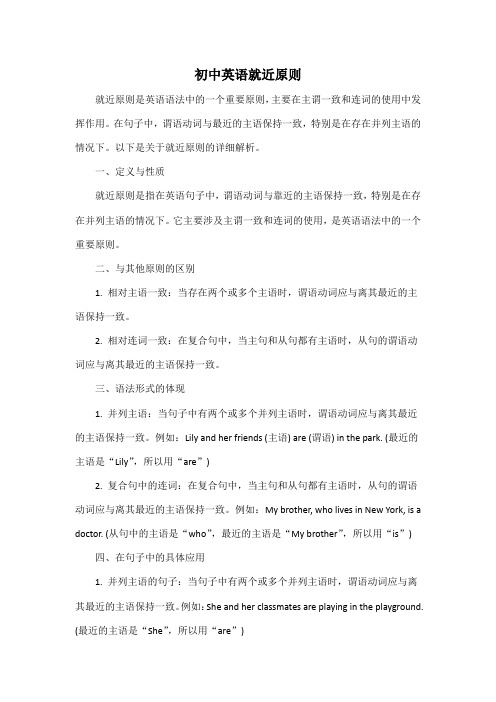
初中英语就近原则就近原则是英语语法中的一个重要原则,主要在主谓一致和连词的使用中发挥作用。
在句子中,谓语动词与最近的主语保持一致,特别是在存在并列主语的情况下。
以下是关于就近原则的详细解析。
一、定义与性质就近原则是指在英语句子中,谓语动词与靠近的主语保持一致,特别是在存在并列主语的情况下。
它主要涉及主谓一致和连词的使用,是英语语法中的一个重要原则。
二、与其他原则的区别1. 相对主语一致:当存在两个或多个主语时,谓语动词应与离其最近的主语保持一致。
2. 相对连词一致:在复合句中,当主句和从句都有主语时,从句的谓语动词应与离其最近的主语保持一致。
三、语法形式的体现1. 并列主语:当句子中有两个或多个并列主语时,谓语动词应与离其最近的主语保持一致。
例如:Lily and her friends (主语) are (谓语) in the park. (最近的主语是“Lily”,所以用“are”)2. 复合句中的连词:在复合句中,当主句和从句都有主语时,从句的谓语动词应与离其最近的主语保持一致。
例如:My brother, who lives in New York, is a doctor. (从句中的主语是“who”,最近的主语是“My brother”,所以用“is”)四、在句子中的具体应用1. 并列主语的句子:当句子中有两个或多个并列主语时,谓语动词应与离其最近的主语保持一致。
例如:She and her classmates are playing in the playground. (最近的主语是“She”,所以用“are”)2. 复合句中的句子:在复合句中,从句的谓语动词应与离其最近的主语保持一致。
例如:My father, who is a teacher, teaches English. (从句中的主语是“who”,最近的主语是“My father”,所以用“is”)五、对初中英语学习的意义掌握就近原则对于初中英语学习非常重要。
人教版中考英语复习主谓一致原则详细讲解和讲义(一)
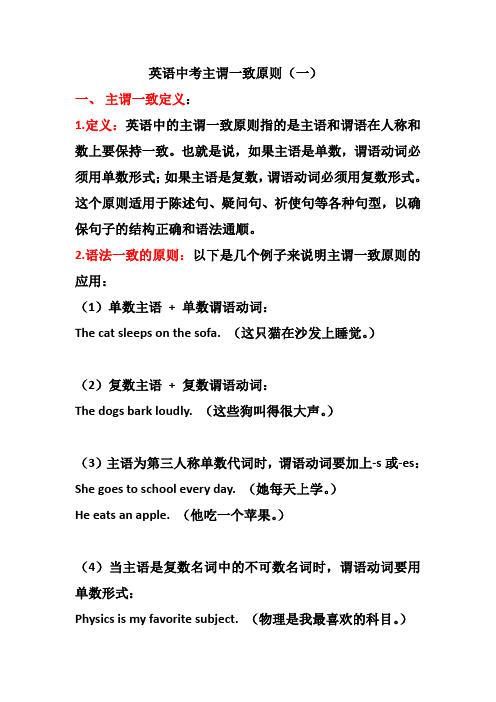
英语中考主谓一致原则(一)一、主谓一致定义:1.定义:英语中的主谓一致原则指的是主语和谓语在人称和数上要保持一致。
也就是说,如果主语是单数,谓语动词必须用单数形式;如果主语是复数,谓语动词必须用复数形式。
这个原则适用于陈述句、疑问句、祈使句等各种句型,以确保句子的结构正确和语法通顺。
2.语法一致的原则:以下是几个例子来说明主谓一致原则的应用:(1)单数主语+ 单数谓语动词:The cat sleeps on the sofa. (这只猫在沙发上睡觉。
)(2)复数主语+ 复数谓语动词:The dogs bark loudly. (这些狗叫得很大声。
)(3)主语为第三人称单数代词时,谓语动词要加上-s或-es:She goes to school every day. (她每天上学。
)He eats an apple. (他吃一个苹果。
)(4)当主语是复数名词中的不可数名词时,谓语动词要用单数形式:Physics is my favorite subject. (物理是我最喜欢的科目。
)(5)当主语是连接词(如and, or, nor)连接的多个名词时,谓语动词的单复数形式取决于最靠近谓语动词的名词:二、什么叫“就前原则”?1.定义:指的是,在复合句中,如果主语是由连接词引导的多个名词或代词构成的,那么谓语动词的单复数应该与就近的那个名词或代词保持一致。
也就是说,当一个主语由两个或更多个并列词组成时,谓语动词应该与靠近谓语动词的那个词在人称和数上保持一致。
2.与with, along with, together with, like, except, but, as well as等连接词的特殊用法:英语中的“就前原则”是指当一个句子中有多个主语时,谓语动词的单复数形式应该与靠近它的主语保持一致。
这个原则在连接词如with, along with, together with, like, except, but, as well as等连接多个名词时同样适用。
初中英语主谓一致和就近原则讲解及练习
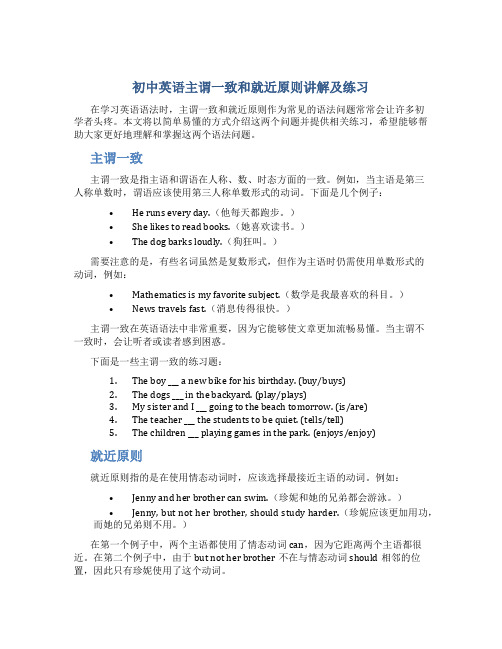
初中英语主谓一致和就近原则讲解及练习在学习英语语法时,主谓一致和就近原则作为常见的语法问题常常会让许多初学者头疼。
本文将以简单易懂的方式介绍这两个问题并提供相关练习,希望能够帮助大家更好地理解和掌握这两个语法问题。
主谓一致主谓一致是指主语和谓语在人称、数、时态方面的一致。
例如,当主语是第三人称单数时,谓语应该使用第三人称单数形式的动词。
下面是几个例子:•He runs every day.(他每天都跑步。
)•She likes to read books.(她喜欢读书。
)•The dog barks loudly.(狗狂叫。
)需要注意的是,有些名词虽然是复数形式,但作为主语时仍需使用单数形式的动词,例如:•Mathematics is my favorite subject.(数学是我最喜欢的科目。
)•News travels fast.(消息传得很快。
)主谓一致在英语语法中非常重要,因为它能够使文章更加流畅易懂。
当主谓不一致时,会让听者或读者感到困惑。
下面是一些主谓一致的练习题:1.The boy ___ a new bike for his birthday. (buy/buys)2.The dogs ___ in the backyard. (play/plays)3.My sister and I ___ going to the beach tomorrow. (is/are)4.The teacher ___ the students to be quiet. (tells/tell)5.The children ___ playing games in the park. (enjoys/enjoy)就近原则就近原则指的是在使用情态动词时,应该选择最接近主语的动词。
例如:•Jenny and her brother can swim.(珍妮和她的兄弟都会游泳。
)•Jenny, but not her brother, should study harder.(珍妮应该更加用功,而她的兄弟则不用。
英语语法中几个就近原则

英语语法中几个就近原则在英语语法中,有几个就近原则,用来指导句子结构和词语使用。
这些原则涵盖了句法、语义和语用等方面。
以下是几个常见的就近原则:1. 主谓一致原则:主谓一致是指在句子中,主语的数与谓语动词的数要保持一致。
例如,主语是单数,谓语动词也要用单数形式;主语是复数,谓语动词则要用复数形式。
这个原则适用于大多数情况,但也有一些例外,如collective noun(集合名词)等。
2. 代词一致原则:代词一致是指代词的人称和数要与其所指的名词保持一致。
例如,如果代词指代的是单数名词,代词也要用单数形式;如果名词是复数,则代词也要用复数形式。
代词的一致原则还涉及到性别的一致性,如he, she, it等代词。
3.就近修饰原则:就近修饰是指形容词、副词或短语修饰最近的名词或动词。
当有多个名词或动词在句子中出现时,修饰语通常放在最近的名词或动词前面,以确保修饰的准确性和清晰度。
4.就近一致原则:就近一致是指谓语动词的数要与最近的主语保持一致。
即使在一个句子中有多个主语,谓语动词也应与最近的主语保持一致。
这个原则有助于提高句子的流畅性和可读性。
5.就近匹配原则:就近匹配是指介词、关系代词和其他修饰语与它前面的名词、动词或词组的关系保持一致。
例如,介词通常与紧随其后的名词或代词的数、人称和性别相匹配。
这个原则有助于确保句子的逻辑和语法的一致性。
这些就近原则在英语语法中起着重要的作用,可以帮助人们构造正确、准确和通顺的句子。
遵循这些原则可以使句子的结构更加清晰,并避免一些常见的语法错误。
同时,了解这些原则也有助于理解和解释他人的语言使用。
在学习英语时,掌握并应用这些原则是很重要的。
中学初中英语语法——主谓一致详解
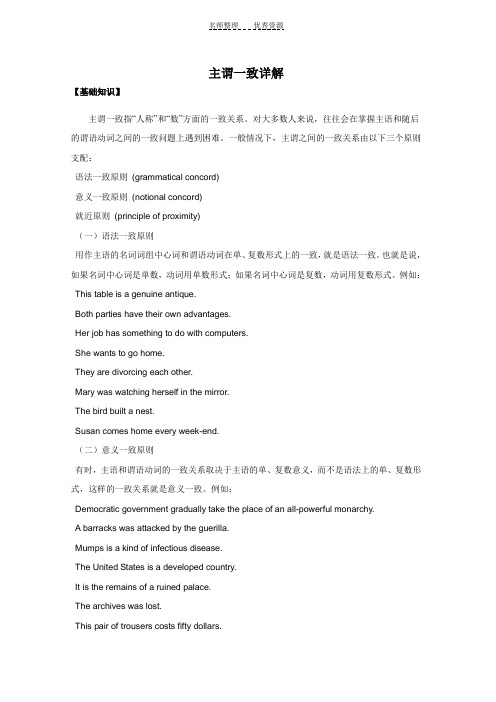
主谓一致详解【基础知识】主谓一致指“人称”和“数”方面的一致关系。
对大多数人来说,往往会在掌握主语和随后的谓语动词之间的一致问题上遇到困难。
一般情况下,主谓之间的一致关系由以下三个原则支配:语法一致原则(grammatical concord)意义一致原则(notional concord)就近原则(principle of proximity)(一)语法一致原则用作主语的名词词组中心词和谓语动词在单、复数形式上的一致,就是语法一致。
也就是说,如果名词中心词是单数,动词用单数形式;如果名词中心词是复数,动词用复数形式。
例如:This table is a genuine antique.Both parties have their own advantages.Her job has something to do with computers.She wants to go home.They are divorcing each other.Mary was watching herself in the mirror.The bird built a nest.Susan comes home every week-end.(二)意义一致原则有时,主语和谓语动词的一致关系取决于主语的单、复数意义,而不是语法上的单、复数形式,这样的一致关系就是意义一致。
例如:Democratic government gradually take the place of an all-powerful monarchy.A barracks was attacked by the guerilla.Mumps is a kind of infectious disease.The United States is a developed country.It is the remains of a ruined palace.The archives was lost.This pair of trousers costs fifty dollars.(三)就近原则有时,谓语动词的单、复数形式决定于最靠近它的词语。
(完整)初中英语主谓一致和就近原则讲解及练习.doc
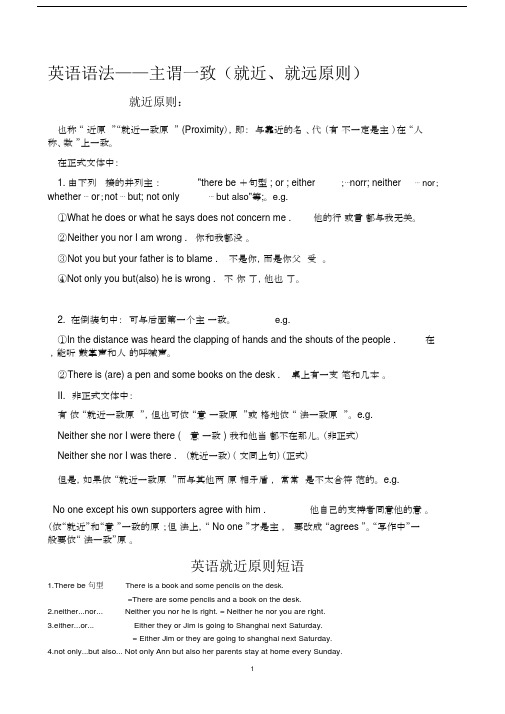
英语语法——主谓一致(就近、就远原则)就近原则:也称“ 近原”“就近一致原” (Proximity),即:与靠近的名、代(有不一定是主)在“人称、数”上一致。
在正式文体中:1. 由下列接的并列主:"there be +句型 ; or ; either;⋯norr; neither⋯nor;whether ⋯ or;not ⋯ but; not only⋯but also"等;。
e.g.①What he does or what he says does not concern me .他的行或言都与我无关。
②N either you nor I am wrong . 你和我都没。
③N ot you but your father is to blame . 不是你,而是你父受。
④Not only you but(also) he is wrong . 不你了,他也了。
2. 在倒装句中:可与后面第一个主一致。
e.g.①In the distance was heard the clapping of hands and the shouts of the people .在,能听鼓掌声和人的呼喊声。
②T here is (are) a pen and some books on the desk . 桌上有一支笔和几本。
II.非正式文体中:有依“就近一致原”,但也可依“意一致原”或格地依“ 法一致原”。
e.g.Neither she nor I were there (意一致)我和他当都不在那儿。
(非正式)Neither she nor I was there .(就近一致)(文同上句)(正式)但是,如果依“就近一致原”而与其他两原相矛盾,常常是不太合符范的。
e.g.No one except his own supporters agree with him .他自己的支持者同意他的意。
英语主谓一致中就近原则和就远原则
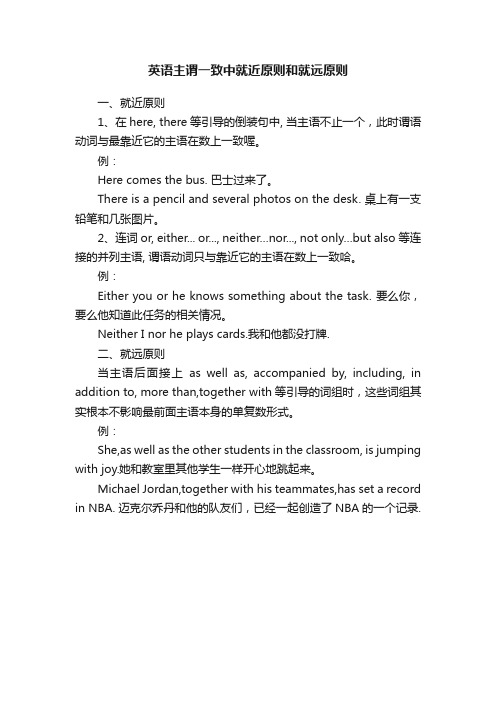
英语主谓一致中就近原则和就远原则
一、就近原则
1、在here, there等引导的倒装句中, 当主语不止一个,此时谓语动词与最靠近它的主语在数上一致喔。
例:
Here comes the bus. 巴士过来了。
There is a pencil and several photos on the desk. 桌上有一支铅笔和几张图片。
2、连词or, either... or..., neither…nor..., not only…but also 等连接的并列主语, 谓语动词只与靠近它的主语在数上一致哈。
例:
Either you or he knows something about the task. 要么你,要么他知道此任务的相关情况。
Neither I nor he plays cards.我和他都没打牌.
二、就远原则
当主语后面接上as well as, accompanied by, including, in addition to, more than,together with等引导的词组时,这些词组其实根本不影响最前面主语本身的单复数形式。
例:
She,as well as the other students in the classroom, is jumping with joy.她和教室里其他学生一样开心地跳起来。
Michael Jordan,together with his teammates,has set a record in NBA. 迈克尔乔丹和他的队友们,已经一起创造了NBA的一个记录.。
主谓一致——就近原则
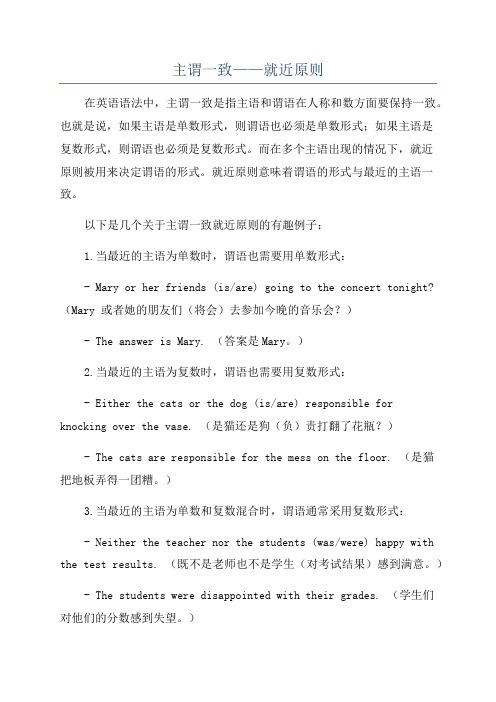
主谓一致——就近原则在英语语法中,主谓一致是指主语和谓语在人称和数方面要保持一致。
也就是说,如果主语是单数形式,则谓语也必须是单数形式;如果主语是复数形式,则谓语也必须是复数形式。
而在多个主语出现的情况下,就近原则被用来决定谓语的形式。
就近原则意味着谓语的形式与最近的主语一致。
以下是几个关于主谓一致就近原则的有趣例子:1.当最近的主语为单数时,谓语也需要用单数形式:- Mary or her friends (is/are) going to the concert tonight? (Mary 或者她的朋友们(将会)去参加今晚的音乐会?)- The answer is Mary. (答案是Mary。
)2.当最近的主语为复数时,谓语也需要用复数形式:- Either the cats or the dog (is/are) responsible for knocking over the vase. (是猫还是狗(负)责打翻了花瓶?)- The cats are responsible for the mess on the floor. (是猫把地板弄得一团糟。
)3.当最近的主语为单数和复数混合时,谓语通常采用复数形式:- Neither the teacher nor the students (was/were) happy with the test results. (既不是老师也不是学生(对考试结果)感到满意。
)- The students were disappointed with their grades. (学生们对他们的分数感到失望。
)4.当最近的主语为两个同一类的名词时,谓语通常与最近的主语保持一致:- The cat and the dog (is/are) playing in the garden. (猫和狗(在花园里)玩耍。
)- The cat is chasing the dog. (猫正在追逐狗。
中考英语专题12 主谓一致(解析版)
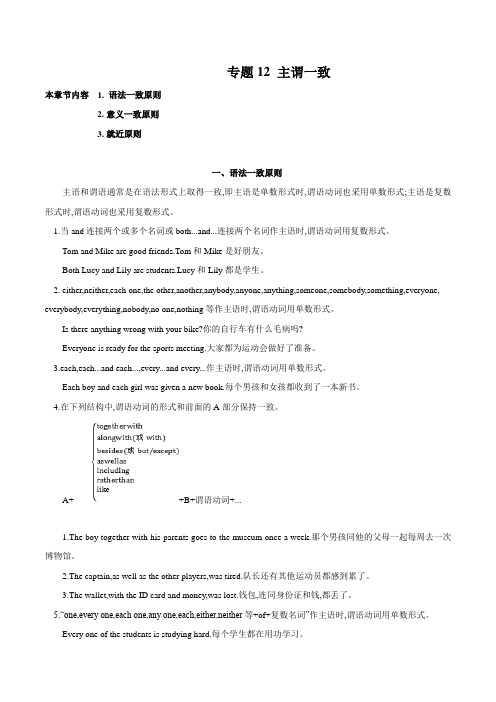
专题12 主谓一致本章节内容 1. 语法一致原则2.意义一致原则3.就近原则一、语法一致原则主语和谓语通常是在语法形式上取得一致,即主语是单数形式时,谓语动词也采用单数形式;主语是复数形式时,谓语动词也采用复数形式。
1.当and连接两个或多个名词或both...and...连接两个名词作主语时,谓语动词用复数形式。
Tom and Mike are good friends.Tom和Mike是好朋友。
Both Lucy and Lily are students.Lucy和Lily都是学生。
2.either,neither,each one,the other,another,anybody,anyone,anything,someone,somebody,something,everyone, everybody,everything,nobody,no one,nothing等作主语时,谓语动词用单数形式。
Is there anything wrong with your bike?你的自行车有什么毛病吗?Everyone is ready for the sports meeting.大家都为运动会做好了准备。
3.each,each...and each...,every...and every...作主语时,谓语动词用单数形式。
Each boy and each girl was given a new book.每个男孩和女孩都收到了一本新书。
4.在下列结构中,谓语动词的形式和前面的A部分保持一致。
A++B+谓语动词+...1.The boy together with his parents goes to the museum once a week.那个男孩同他的父母一起每周去一次博物馆。
2.The captain,as well as the other players,was tired.队长还有其他运动员都感到累了。
2024年中考英语一轮复习:主谓一致三原则+知识点考点总结(讲义)

2024届九年级英语中考一轮复习【语法专题】主谓一致知识点考点总结(讲义)英语中主谓一致的含义有以下三个方面一,语法一致原则,二,意义一致原则,三,就近一致原则。
主谓一致,中考必考,掌握好这一语法点,对于写作提升也大有帮助。
一,语法一致原则主语和谓语通常在语法形式上取得一致,也就是说主语是单数形式,谓语动词也用单数形式,主语是复数形式,谓语动词也采用复数形式。
【单后单,复后复】①主语是第三人称单数,谓语动词用单数He goes to the library every week.他每周都去图书馆。
②由and和both and连接,谓语形式用复数Mary and her best friend are talking about school.玛丽和她的好朋友在谈论学校。
③普通不定代词: either /neither/ another复合不定代词: some/ any /no/every-+ thing/ body /one ,谓语形式用单数Someone is knocking at the door .Could you please open the door?有人在敲门,请你去开门好吗?Everyone is ready for the sports meeting.大家为运动会都做好了准备。
④表“每一” :each /every /each...and each.../ every...and every...Each boy and each girl was given a gift.给了每一个男孩和每一个女孩一个礼物。
⑤由each/either /neither /one等加of加名词/代词复数做主语时,谓语动词用单数Neither of the books is good.这两本书都不好。
二,意义一致原则意义一致又叫概念一致,也就是说,主语所表达的意义,决定了谓语动词的单复数形式。
初中英语主谓一致语法讲解
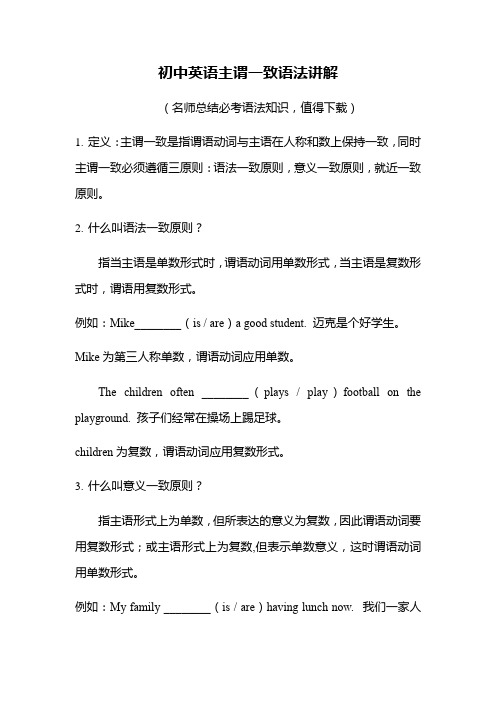
初中英语主谓一致语法讲解(名师总结必考语法知识,值得下载)1.定义:主谓一致是指谓语动词与主语在人称和数上保持一致,同时主谓一致必须遵循三原则:语法一致原则,意义一致原则,就近一致原则。
2.什么叫语法一致原则?指当主语是单数形式时,谓语动词用单数形式,当主语是复数形式时,谓语用复数形式。
例如:Mike________(is / are)a good student. 迈克是个好学生。
Mike为第三人称单数,谓语动词应用单数。
The children often ________(plays / play)football on the playground. 孩子们经常在操场上踢足球。
children为复数,谓语动词应用复数形式。
3.什么叫意义一致原则?指主语形式上为单数,但所表达的意义为复数,因此谓语动词要用复数形式;或主语形式上为复数,但表示单数意义,这时谓语动词用单数形式。
例如:My family ________(is / are)having lunch now. 我们一家人现在正吃午饭。
Family指一家人,所以谓语用复数。
Twenty dollars ________(is / are)too expensive for the book. 这本书20美元太贵了。
Twenty dollars这里是一个单独的个体,所以意义为单数,谓语动词用单数。
4.什么叫就近一致原则?指谓语动词的单复数形式,取决于最靠近它的主语。
例如:Not only the teacher but also his students ________(like / likes)playing football.不仅老师喜欢踢足球,而且他的学生也喜欢踢足球。
Like前面的主语为students,故根据就近原则谓语动词用复数形式。
There ________(is / are)a pen and some books on the desk. 课桌上有一支钢笔和一些书。
主谓一致和就近就远原则
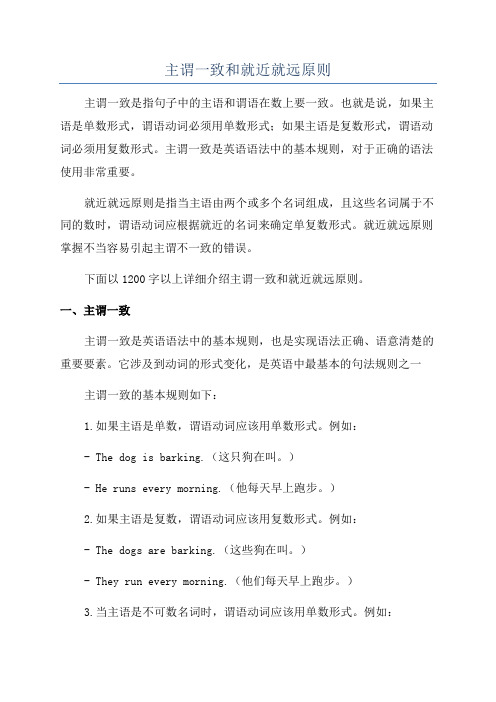
主谓一致和就近就远原则主谓一致是指句子中的主语和谓语在数上要一致。
也就是说,如果主语是单数形式,谓语动词必须用单数形式;如果主语是复数形式,谓语动词必须用复数形式。
主谓一致是英语语法中的基本规则,对于正确的语法使用非常重要。
就近就远原则是指当主语由两个或多个名词组成,且这些名词属于不同的数时,谓语动词应根据就近的名词来确定单复数形式。
就近就远原则掌握不当容易引起主谓不一致的错误。
下面以1200字以上详细介绍主谓一致和就近就远原则。
一、主谓一致主谓一致是英语语法中的基本规则,也是实现语法正确、语意清楚的重要要素。
它涉及到动词的形式变化,是英语中最基本的句法规则之一主谓一致的基本规则如下:1.如果主语是单数,谓语动词应该用单数形式。
例如:- The dog is barking.(这只狗在叫。
)- He runs every morning.(他每天早上跑步。
)2.如果主语是复数,谓语动词应该用复数形式。
例如:- The dogs are barking.(这些狗在叫。
)- They run every morning.(他们每天早上跑步。
)3.当主语是不可数名词时,谓语动词应该用单数形式。
例如:- Rice is a staple food in many countries.(大米是许多国家的主食。
)- Water covers about 71% of the Earth's surface.(水覆盖了地球表面的约71%。
)4. 当主语是由两个或多个单数名词或代词连接而成,并且以 and 连接时,谓语动词应该用复数形式。
例如:- Peter and John are playing basketball.(彼得和约翰正在打篮球。
)- Mary and her brothers are studying in the same school.(玛丽和她的兄弟们在同一所学校上学。
)5. 当主语是由两个或多个单数名词或代词连接而成,并且以 or, either...or, neither...nor等连接时,谓语动词应该与最靠近它的主语保持一致。
2024年初中英语语法主谓一致学习之意义一致与就近一致原则

2024年初中英语语法主谓一致学习之意义一致与就近一致原则意义一致原则是指在英语语法中,主语和谓语在单复数意义上保持一致的原则。
这意味着,有时主语名词在语法形式上虽然是单数,却有着复数意义,其后的谓语动词便用复数。
反之亦如此。
1. 在英语中,一些名词的单复数形式相同,因此在使用这些名词作为主语时,需要根据它们所表达的意义来决定谓语动词的单复数形式。
例如,当sheep 或deer 作主语时,谓语动词应该使用单数形式,而当fish 作主语时,谓语动词应该使用复数形式。
同样的规则也适用于means、species、Chinese、Japanese 和series 等名词。
Sheep and deer are called “sheep”because they are sheeplike animals. (单数)Fish and fish are called “fish”because they are fishlike animals. (单数)Means and means are called “means”because they are ways of achieving something. (单数)Species and species are called “species”because they are different forms of the same organism. (单数)Chinese and Chinese are called “Chinese”because they are people from China. (单数)Japanese and Japanese are called “Japanese”because they arepeople from Japan. (单数)Series and series are called “series”because they are groups of related things. (复数)2. 使用“the”前缀时,需要根据形容词或名词的含义来确定谓语动词的单复数形式。
2024年人教版英语中考主谓一致原则详细讲解和讲义(三)
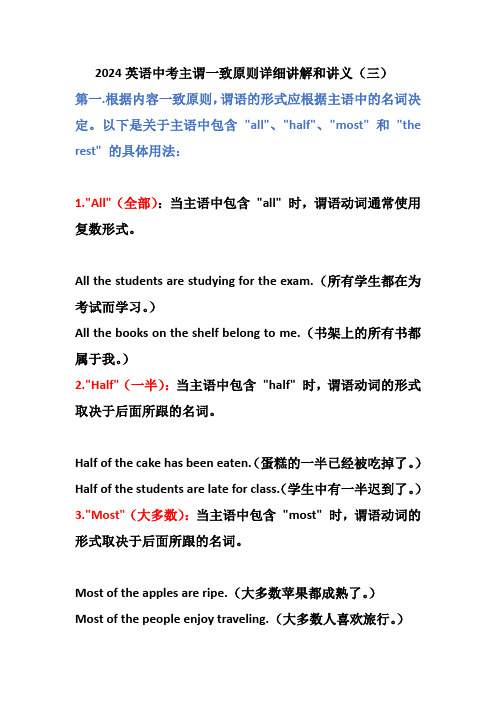
2024英语中考主谓一致原则详细讲解和讲义(三)第一.根据内容一致原则,谓语的形式应根据主语中的名词决定。
以下是关于主语中包含"all"、"half"、"most" 和"the rest" 的具体用法:1."All"(全部):当主语中包含"all" 时,谓语动词通常使用复数形式。
All the students are studying for the exam.(所有学生都在为考试而学习。
)All the books on the shelf belong to me.(书架上的所有书都属于我。
)2."Half"(一半):当主语中包含"half" 时,谓语动词的形式取决于后面所跟的名词。
Half of the cake has been eaten.(蛋糕的一半已经被吃掉了。
)Half of the students are late for class.(学生中有一半迟到了。
)3."Most"(大多数):当主语中包含"most" 时,谓语动词的形式取决于后面所跟的名词。
Most of the apples are ripe.(大多数苹果都成熟了。
)Most of the people enjoy traveling.(大多数人喜欢旅行。
)4."The rest"(剩余的部分):当主语中包含"the rest" 时,谓语动词的形式取决于后面所跟的名词。
The rest of the team is waiting outside.(队伍的其他人正在外面等待。
)The rest of the books need to be returned to the library.(其他的书需要归还到图书馆。
中考英语词汇复习资料主谓一致,就近原则,语法一致原则,意义一致原则
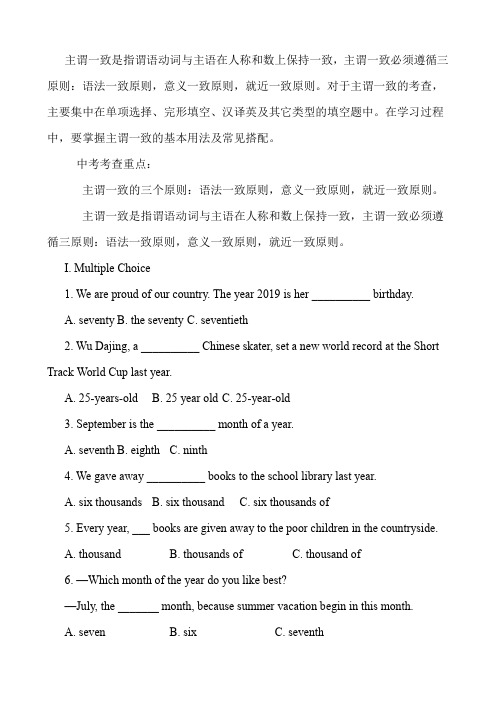
主谓一致是指谓语动词与主语在人称和数上保持一致,主谓一致必须遵循三原则:语法一致原则,意义一致原则,就近一致原则。
对于主谓一致的考查,主要集中在单项选择、完形填空、汉译英及其它类型的填空题中。
在学习过程中,要掌握主谓一致的基本用法及常见搭配。
中考考查重点:主谓一致的三个原则:语法一致原则,意义一致原则,就近一致原则。
主谓一致是指谓语动词与主语在人称和数上保持一致,主谓一致必须遵循三原则:语法一致原则,意义一致原则,就近一致原则。
I. Multiple Choice1. We are proud of our country. The year 2019 is her __________ birthday.A. seventyB. the seventyC. seventieth2. Wu Dajing, a __________ Chinese skater, set a new world record at the Short Track World Cup last year.A. 25-years-oldB. 25 year oldC. 25-year-old3. September is the __________ month of a year.A. seventhB. eighthC. ninth4. We gave away __________ books to the school library last year.A. six thousandsB. six thousandC. six thousands of5. Every year, ___ books are given away to the poor children in the countryside.A. thousandB. thousands ofC. thousand of6. —Which month of the year do you like best?—July, the _______ month, because summer vacation begin in this month.A. sevenB. sixC. seventh7. —We’ll celebrate the _____ National Day this year.—That’s really exciting。
初中英语主谓一致和就近原则讲解及练习

初中英语主谓一致和就近原则讲解及练习Prepared on 21 November 2021英语语法——主谓一致(就近、就远原则)就近原则:也称“邻近原则”“就近一致原则”(Proximity),即:谓语与靠近的名词、代词(有时不一定是主语)在“人称、数”上一致。
在正式文体中:1.由下列词语连接的并列主语:"there be+句型; or ; either …or;nor; neither…nor;whether…or;not…but; not only…but also" ; 等。
e.g.①What he does or what he says does not concern me . 他的行为或言谈都与我无关。
②Neither you nor I am wrong . 你和我都没错。
③Not you but your father is to blame . 不是你,而是你父亲该受责备。
④Not only you but(also) he is wrong .不仅你错了,他也错了。
2. 在倒装句中:谓语可与后面第一个主语一致。
e.g.①In the distance was heard the clapping of hands and the shouts of the people . 在远处,能听见鼓掌声和人们的呼喊声。
②There is (are) a pen and some books on the desk .桌上有一支钢笔和几本书。
II. 非正式文体中:有时依“就近一致原则”,但也可依“意义一致原则”或严格地依“语法一致原则”。
e.g.Neither she nor I were there (意义一致) 我和他当时都不在那儿。
(非正式)Neither she nor I was there .(就近一致)(译文同上句)(正式)但是,如果依“就近一致原则”而与其他两项原则相矛盾时,则常常认为是不太合符规范的。
九年义务初中英语主谓一致就近原则高频考点知识梳理

主谓一致是指主语和谓语在人称和数上保持一致的语法现象。
就近原则是指谓语动词的单复数形式应与离它最近的主语保持一致。
在九年义务初中英语中,主谓一致就近原则是一个经常出现的考点,下面对该知识进行梳理。
一、主谓一致的基本规则1.如果主语是单数第三人称,谓语动词要用单数形式。
例如:- Jane reads books in the library. (主语是单数第三人称,谓语动词用单数形式reads)2.如果主语是复数第一人称,谓语动词要用复数形式。
例如:- We play football after school. (主语是复数第一人称,谓语动词用复数形式play)3.如果主语是复数第二人称或复数第三人称,谓语动词要用复数形式。
例如:- You are students. (主语是复数第二人称,谓语动词用复数形式are)- They like swimming. (主语是复数第三人称,谓语动词用复数形式like)4.如果主语是单数第一人称,谓语动词可以用单数或复数形式。
例如:- I am a student. (主语是单数第一人称,谓语动词可以用单数形式am)- I like swimming. (主语是单数第一人称,谓语动词可以用复数形式like)5.当主语是由两个或两个以上的名词作并列结构时,谓语动词要用复数形式。
例如:- Tom and Jerry are good friends. (主语由Tom和Jerry构成,谓语动词用复数形式are)二、主谓一致的就近原则就近原则是指谓语动词的单复数形式应与离它最近的主语保持一致。
具体规则如下:1. 如果两个或两个以上的名词作并列主语,用and连接时,谓语动词要用复数形式。
例如:- Tom and Jerry are good friends. (主语Tom和Jerry是并列主语,谓语动词用复数形式are)2.如果并列主语中有一个是单数,另一个是复数,谓语动词应与距离它更近的主语保持一致。
初中英语语法中考主谓一致
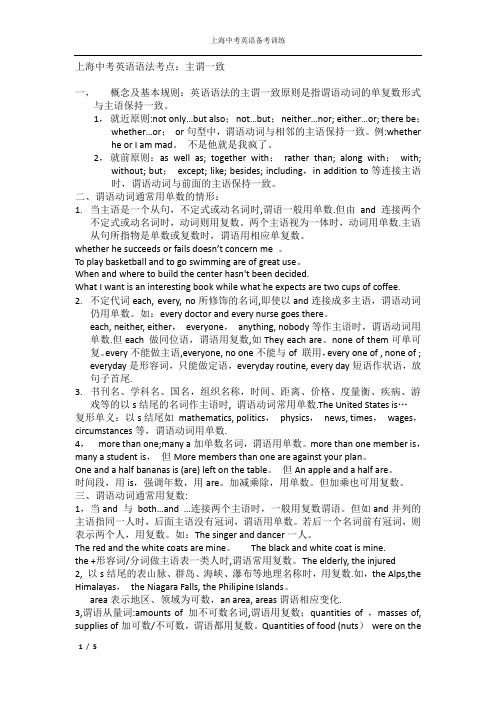
上海中考英语语法考点:主谓一致一,概念及基本规则:英语语法的主谓一致原则是指谓语动词的单复数形式与主语保持一致。
1,就近原则:not onl y…but also;not…but;neither…no r; either…or; there be;whether…or;or句型中,谓语动词与相邻的主语保持一致。
例:whetherhe or I am mad。
不是他就是我疯了。
2,就前原则:as well as; together with;rather than; along with;with;without; but;except; like; besides; including,in addition to等连接主语时,谓语动词与前面的主语保持一致。
二、谓语动词通常用单数的情形:1.当主语是一个从句,不定式或动名词时,谓语一般用单数.但由and 连接两个不定式或动名词时,动词则用复数。
两个主语视为一体时,动词用单数.主语从句所指物是单数或复数时,谓语用相应单复数。
whether he succeeds or fails doesn’t concern me 。
To play basketball and to go swimming are of great use。
When and where to build the center hasn't been decided.What I want is an interesting book while what he expects are two cups of coffee.2.不定代词each, every, no所修饰的名词,即使以and连接成多主语,谓语动词仍用单数。
如:every doctor and every nurse goes there。
each, neither, either,everyone,anything, nobody等作主语时,谓语动词用单数.但each 做同位语,谓语用复数,如They each are。
- 1、下载文档前请自行甄别文档内容的完整性,平台不提供额外的编辑、内容补充、找答案等附加服务。
- 2、"仅部分预览"的文档,不可在线预览部分如存在完整性等问题,可反馈申请退款(可完整预览的文档不适用该条件!)。
- 3、如文档侵犯您的权益,请联系客服反馈,我们会尽快为您处理(人工客服工作时间:9:00-18:30)。
中考英语语法之主谓一致、就近原则讲解【导读】就近原则也称“邻近原则”“就近一致原则”(Proximity),即:谓语与靠近的名词、代词(有时不一定是主语)在“人称、数”上一致。
小编在此搜集整理了中考英语语法之就近原则讲解,希望对大家有所帮助。
I.在正式文体中:1.由下列词语连接的并列主语:"there be+句型;or;either…or;nor;neither…nor;whether…or;not…but;not only…but also";等。
e.g.①What he does or what he says does not concern me.他的行为或言谈都与我无关。
②Neither you nor I am wrong.你和我都没错。
③Not you but your father is to blame.不是你,而是你父亲该受责备。
④Not only you but(also)he is wrong.不仅你错了,他也错了。
2.在倒装句中:谓语可与后面第一个主语一致。
e.g.①In the distance was heard the clapping of hands and the shouts of the people.在远处,能听见鼓掌声和人们的呼喊声。
②There is(are)a pen and some books on the desk.桌上有一支钢笔和几本书。
II.非正式文体中:有时依“就近一致原则”,但也可依“意义一致原则”或严格地依“语法一致原则”。
e.g.Neither she nor I were there(意义一致)我和他当时都不在那儿。
(非正式)Neither she nor I was there.(就近一致)(译文同上句)(正式)但是,如果依“就近一致原则”而与其他两项原则相矛盾时,则常常认为是不太合符规范的。
e.g.No one except his own supporters agree with him.仅他自己的支持者同意他的意见。
(依“就近”和“意义”一致的原则;但语法上,“No one”才是主语,谓语要改成“agrees”。
“写作中”一般要依“语法一致”原则。
就近原则也称“邻近原则”“就近一致原则”(Proximity),即:谓语与靠近的名词、代词(有时不一定是主语)在“人称、数”上一致。
I.在正式文体中:1.由下列词语连接的并列主语:"or;either…or;nor;neither…or;whether…or;not…but;not only…but also";等。
e.g.①What he does or what he says does not concern me.他的行为或言谈都与我无关。
②Neither you nor I am wrong.你和我都没错。
③Not you but your father is to blame.不是你,而是你父亲该受责备。
④Not only you hut(also)he is wrong.不仅你错了,他也错了。
2.在倒装句中:谓语可与后面第一个主语一致。
e.g.①In the distance was heard the clapping of hands and the shouts of the people.在远处,能听见鼓掌声和人们的呼喊声。
②There is(are)a pen and some books on the desk.桌上有一支钢笔和几本书。
II.非正式文体中:有时依“就近一致原则”,但也可依“意义一致原则”或严格地依“语法一致原则”。
e.g. Neither she nor I were there(意义一致)我和他当时都不在那儿。
(非正式)Neither she nor I was there.(就近一致)(译文同上句)(正式)但是,如果依“就近一致原则”而与其他两项原则相矛盾时,则常常认为是不太合符规范的。
e.g.No one except his own supporters agree with him.仅他自己的支持者同意他的意见。
(依“就近”和“意义”一致的原则;但语法上,“No one”才是主语,谓语要改成“agrees”。
“写作中”一般要依“语法一致”原则。
就近原则:A or B+动词Either A or B+动词Neither A nor B+动词Not only A but also B+动词其中,动词的单复数要看B这个名词的单复数。
如:He or I am in the wrong,他或是我错了。
Neither you nor he is tired.你和他都没累。
Not you but I am to blame.不该怪你而该怪我。
Either my father or my brothers are coming.不是我父亲就是我兄弟要来。
Not only the students but also their teacher is enjoying the film.不仅学生们在欣赏这部影片,他们的老师也在欣赏这部影片。
但在非正式文体中,有时也一律用复数谓语(注:在考试时最好避免使用)。
如:Neither Ted nor Mark are wrong.特德和马克都没有错。
If either David or Janet come,they will want a drink.大卫或珍妮特来了的话,是会要喝酒的。
就远原则:以下情况主语与谓语之间要求就远原则:A with/besides/but+B+动词A together with+B+动词A as well as+B+动词A no less than+B+动词其中,动词与A主语一致。
如:Everybody except you is down on me.除了你,大家都看不起我。
A woman with two children has come.一位妇女带着两个孩子已经来了。
John,rather than his roommates,is to blame.约翰,而不是他的室友,应该受到责备。
Jim,together with his classmates,has seen the film.吉姆和他的同学都看过这部电影。
My father,no less than I,is a base-ball fan.我的父亲不亚于我也是个棒球迷。
The son,as well as his parents,wants to go there.不但儿子想去那儿,而且他的父母也想去。
The teacher,as well as the students,is interested in the activity.老师也和同学们一样对这项活动有兴趣。
所谓就近/就远原则是指句子的主语结构很复杂时,如何判断句子谓语的数的问题.1.就近原则:there/here+be/系动词,either...or...,neither...nor...,not only...but(also)...,not...but...,分数/百分数修饰名词(population 类外),表许多的名词(除了quantity)2.就远原则:as well as,(together/along)with,rather than, except/besides/but/including,in addition to,apart from如:Not only you but also I am right.2/3of the earth is covered by water.Many a student in our school has never been abroad.He rather than I is right.Nobody but two students is in the classroom.就前原则主语后面跟有as well as,along with,with,together with,except,besides,including,followed by等引导的词组时,谓语动词的单、复数根据主语的单、复数而定。
The girl as well as boys has learned to use computers就近一致出现几个主语时,谓语动词的人称单复数须最近的主语保持一致。
There be,Here be句型中动词的单复数必须与后置的第一个主语保持一致。
当be后面的主语有两个或两个以上的并列成分时,be动词往往与最邻近的一个一致。
例如:There is an orange,two apples and many bananas on the table.There are two books and a dictionary on the desk.两个做主语的名词或代词由either...or...,neither...nor...,not only...but also...等连接时,谓语动词用靠近原则。
例如:Neither you norI am right.Not only the students but also the teacher is going to attend meeting.但如果用with,together with,like,except,but,no less than,as well as连接两个主语用靠前原则。
例如:Mary as well as you is my friend.The teacher together with some students is visiting the factory.。
